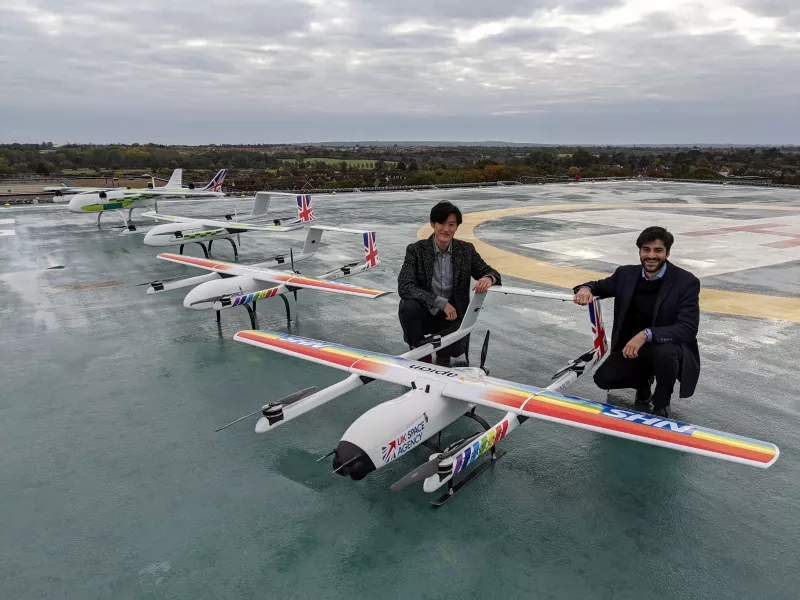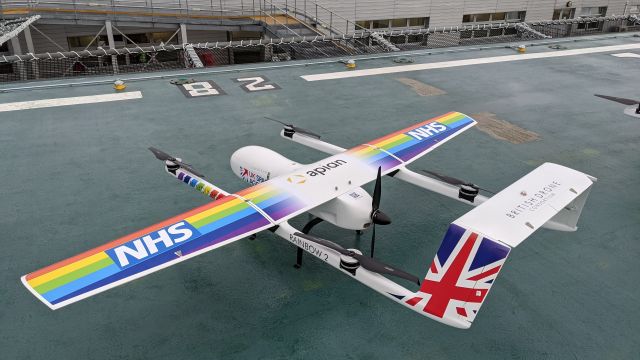Apian, which was founded by NHS staff as part of the NHS Clinical Entrepreneur Programme, aims to establish a network of secure air corridors for electric drones to navigate via satellite-enabled GPS.
Using the drones to help in the Covid-19 response will avoid courier call-out waiting times, free up NHS staff, reduce unnecessary physical contact and minimise the risk of secondary transmission of the virus.
The project will be based at Broomfield Hospital in Chelmsford, part of Mid and South Essex NHS Foundation Trust, and will be supported by the local Anglia Ruskin University as the academic partner.
The hospital stands on a First World War Royal Flying Corps airfield.
Christopher Law, from Apian, said: “Covid-19 has highlighted challenges in NHS supply chain logistics.
“There has never been a better time to create a faster, more dependable and environmentally friendly method of transporting medical supplies.
“We are confident that by setting up a medical drone delivery service, we’ll be able to fly samples to labs more regularly, reliably and quickly, improving patient health outcomes.”
The start-up company was founded by Hammad Jeilani and Mr Law, trainee doctors at the Barts and The London as well as Mid and South Essex NHS innovation fellows.
It is installing drone pad infrastructure so its aircraft can take off from and land at hospitals, laboratories and warehouses.
The company will scale the work from its drone trials by creating the UK’s NHS Air Grid (NAG), a network of secure air corridors designed to safely, rapidly and effectively enable drone delivery across the NHS.
It is working closely with the Civil Aviation Authority, UK Space Agency and the emergency services to create these corridors.
The drones, which can carry a maximum weight of 2kg and fly about 60 miles, will fly at 300ft (90m) above ground level and are designed to fly in harsh weather.
It is a hybrid drone, which means it has the rotors of a typical drone and the wings of a plane, making it very good at flying long distances.
The drones will initially be flying between Broomfield Hospital, Basildon Hospital and the Pathology First Laboratory in Basildon.
The flight path from Broomfield Hospital to the Pathology First Lab is 22km and takes just under 17 minutes.
The flight path from Basildon Hospital to Pathology First is 11.5km and takes just over nine minutes
The healthcare drone company is one of three new projects using space-enabled technologies and services to support the ongoing battle against Covid-19.
The UK Space Agency is also backing DriverNet – a mobile app that will use satellite technology to provide access to more affordable community transport for people wishing to go to and from Covid care providers, and those looking to participate in community sport.
By using artificial intelligence to batch patients by their geolocation – their mobile phone location triangulated by satellites – and encouraging transport sharing, costs and miles could be cut by half.

It is thought this could also help reduce the 15 million missed NHS appointments each year.
Also receiving funding is the delivery of a remote platform for Earth observation learning.
The collaboration, led by the University of Edinburgh, builds on the Earth Blox cloud-based software for harnessing planetary-scale satellite intelligence.
It will provide distance learning support to students who would have been studying Earth observation science.
Earth observation courses involve frequently being in a laboratory and completing practical exercises, and the funding will help make this possible from home.
The three projects, which will share £1.3 million of funding, have been selected as part of a joint initiative between the UK Space Agency and the European Space Agency (ESA).
Science minister Amanda Solloway said: “The efforts of the UK’s space sector to support our incredible NHS during the Covid-19 pandemic have been truly inspirational.
“The projects we are backing today are fantastic examples of how our leading space scientists are supporting those directly on the front line to help prevent the spread of coronavirus.”







